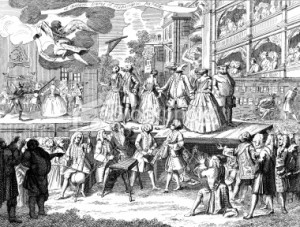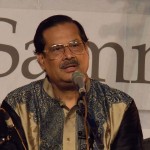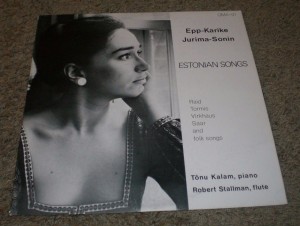22006. (Johann Sebastian Bach) Cantata #13 “Meine Seufzer, meine Tränen”, bwv.13
22007. (Johann Sebastian Bach) Cantata #14 “Wär Gott nicht mit uns diese Zeit”, bwv.14
22008. (Johann Sebastian Bach) Cantata #16 “Herr Gott, dich loben wir”, bwv.16 Read more »
Category Archives: CQ - Listening 2010 - Page 3
LISTENING — MARCH 2010
The Beggar’s Opera

The Beggar’s Opera is a pointed example of unpretentious popular art long outliving the “serious” works of its day. In 1728, a rather unsuccessful English poet, John Gay, penned a satire of the upper class’s taste for Italian Opera, as well as the establishment politics of the day (then personified in First Lord of the Treasury, Robert Walpole). Using a kleptomaniac collection of Scottish and French folk-tunes, Gay conceived a fast-moving, tight-knit plot involving, instead of the usual operatic cast of Classical heroes and deities, the whores and thieves of the London slums. Read more »
First-time listening for February, 2010
21514. (Gabriel Fauré) Piano Quartet #1 in C Minor, Op.15
21515. (Gabriel Fauré) Piano Quartet #2 in G Minor, Op.45
21516. (U2) Boy
21517. (Johann Sebastian Bach) Cantata #10 “Meine Seel erhebt den Herren”, bwv.10 Read more »
William Bolcom’s Songs of Innocence and Songs of Experience
Musicians have long been attracted to William Blake’s interconnected poems known as the Songs of Innocence and of Experience. Allen Ginsberg has asserted that a study of the rhyme and meter of the poems reveals that Blake intended them to be sung. They certainly have the feeling of English tavern ballads strangely mutated into moral and metaphysical meditations. This mixture of serious purpose and popular form is exactly the stuff that best suits American composer William Bolcom. Read more »
First-time listening for January, 2010
21401. (Piirpauke) Kalevala Spirit
21402. (Ismo Alanko Säätiö) Sisäinen solarium [Solarium Within]
21403. (Veils) Nux Vomica Read more »
Epp-Karike Jurima-Sonin: Estonian Songs
A very precise and pleasant voice sings a selection of Estonian art songs and folk songs. The folk material, on the whole, is more captivating. Jurima-Sonin is an American of Estonian background, known as both a teacher and soloist.
[Note inserted in 2018: Some time after this posting I met my friend Skye Sepp’s mother. We discussed Estonian music, and I mentioned this record. Epp-Karike Jurima-Sonin, it turns out, is her sister! She was married to Ain Sonin (1937–2010), a respected physicist specializing in fluid mechanics. The obviously multi-talented Sepp/Sonin clan originated in Estonia, flourished in Toronto, and spread out tentacles to Boston and San Francisco.]
Ajoy Chakraborty
 Chakraborty is the outstanding exponent of the Patiala school of North Indian classical singing. The prestigious Patiala Gharana dates from Mughal times, but it has consistently fostered innovation, rather than strict classical orthodoxy. Chakraborty is one of its many stars. I have two pieces sung by him: Abhogi, and a full khyal using the South Indian raga Hamsadhwani. This last has an emotional punch that really got to me, especially at the point of one impossibly long-held note that lifts the piece into sublimity. The tabla and harmonium (perhaps his brother Sanjay?) are aptly understated. Unfortunately, I only have the sound-files, with no production details.
Chakraborty is the outstanding exponent of the Patiala school of North Indian classical singing. The prestigious Patiala Gharana dates from Mughal times, but it has consistently fostered innovation, rather than strict classical orthodoxy. Chakraborty is one of its many stars. I have two pieces sung by him: Abhogi, and a full khyal using the South Indian raga Hamsadhwani. This last has an emotional punch that really got to me, especially at the point of one impossibly long-held note that lifts the piece into sublimity. The tabla and harmonium (perhaps his brother Sanjay?) are aptly understated. Unfortunately, I only have the sound-files, with no production details.
Sibelius’ Kullervo
 As I’m beginning the year with a re-reading of the Kalevala, the Finnish mythological epic that has haunted me since childhood, it’s logical for me to begin the year’s musical listening with Sibelius’ largest scale work based on it, the spectacular unified sequence of tone poems about the Kalevala hero Kullervo. I have two recordings of Kullervo, Symphonic Poem for Soprano, Baritone, Chorus and Orchestra, Op.7: Jorma Panula conducting the Turku Philharmonic Orchestra, and Paavo Berglund directing the Helsinki Symphony Orchestra. They’re both fine, but I prefer the Berglund. Eeva-Liisa Saarinen’s soprano in it is superb.
As I’m beginning the year with a re-reading of the Kalevala, the Finnish mythological epic that has haunted me since childhood, it’s logical for me to begin the year’s musical listening with Sibelius’ largest scale work based on it, the spectacular unified sequence of tone poems about the Kalevala hero Kullervo. I have two recordings of Kullervo, Symphonic Poem for Soprano, Baritone, Chorus and Orchestra, Op.7: Jorma Panula conducting the Turku Philharmonic Orchestra, and Paavo Berglund directing the Helsinki Symphony Orchestra. They’re both fine, but I prefer the Berglund. Eeva-Liisa Saarinen’s soprano in it is superb.
Read more »
